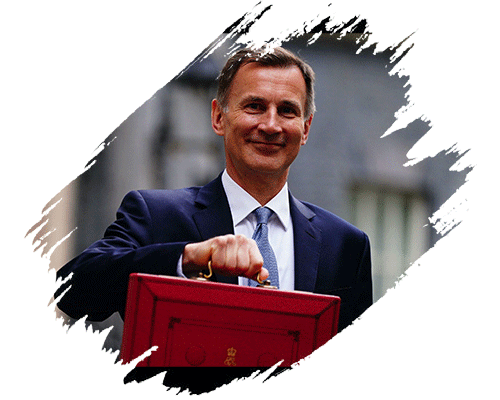Jeremy Hunt says the UK economy has dealt with the financial crisis, the pandemic and energy crisis caused by war in Europe. He acknowledges that interest rates “remain high as we bring down inflation”, but adds: “We can now help families not just with cost of living support but with permanent cuts in taxation.” He calls it a “budget for long term growth”
Inflation
- Inflation is expected to fall below the government’s 2% target in “just a few months’ time”, Hunt says, down from 4% in January. “Nearly a whole year earlier than forecast in the autumn statement,” he adds.
- The Bank of England’s long-term target is to keep inflation at a “low and stable” 2%.
- The figure is down sharply from the 11.1% when Hunt & Rishi Sunak took office in 2022, as inflation in food and energy prices have eased
National insurance
- Hunt confirms that the national insurance contribution rate will be cut from 10% to 8% of pay from April.
- This comes on top of a 2p cut in the autumn statement in November, which reduced the rate from 12% to 10%.
- It is estimated that the 2p cut to national insurance would be worth about £450 a year for someone on a £35,000 full-time salary.
Non-dom tax status
The chancellor confirms non-dom tax status will be “abolished” and replaced by a “modern, simpler and fairer” system from April 2025. The status is enjoyed by people who live in the UK but who have certain overseas links – often determined by whether their father was born abroad. The status means they pay UK tax on money earned here, but not on their worldwide income. After four years, those coming to the UK will pay the same tax as other UK residents.

Property capital gains tax
Hunt says the government will reduce the higher rate of property capital gains tax from 28% to 24%.
Stamp duty relief
For people who purchase more than one dwelling in a single transaction, known as Multiple Dwellings Relief, is scrapped.
Holiday lets
Tax perks for holiday let owners have been scrapped in what critics have warned would be a “£300m raid on landlords”. The Chancellor claims the current rules are “creating a distortion” that is meaning too few properties are available for local people.
Capital gains tax
The higher rate of capital gains tax on residential property is to be cut from 28pc to 24pc, in a boost to landlords. Mr Hunt said the Treasury and the OBR agreed that the move would actually increase tax revenues overall, as it would encourage more property sales.
Non-dom tax raid
The ‘non-dom’ tax regime is to be scrapped and replaced in a measure to raise £2.7bn a year, Mr Hunt said. Non-domicile status allows foreign nationals who live in the UK but are officially domiciled overseas to avoid paying UK tax on any overseas income or capital gains for their first seven years in the country.
But from April 2025, Mr Hunt, new arrivals to the UK will not have to pay tax on foreign income and gains for the first four years of their UK residency. After that, they will pay the same tax as other UK residents. Transition arrangements will be allowed for current non-doms.
‘British ISA’
Mr Hunt promises a new ‘British ISA’ which will provide another £5,000 of annual tax-free investment in UK equities. He says this will “ensure that British savers can benefit from the growth of the most promising UK businesses” while supporting those firms to expand.
Business tax cuts
Mr Hunt noted that in his autumn statement he unveiled a £10bn tax cut for business that make capital investments in the UK, known as “full expensing”. Now, following calls from business lobbying groups, he announced firms will be able to claim tax relief for leased assets as well.

In addition to business rates support, the Chancellor said a further £200m will be provided to the post-pandemic Recovery Loan Scheme which lends money to small businesses to boost growth. Over in the creative industries, the Chancellor said he will give film studios in England 40pc relief on their gross business rates until 2034.
He also unveiled plans for a new tax credit for independent films with budgets of less than £15m.
Fuel duty
Fuel duty is to be frozen for the 14th year running, giving motorists another £5bn tax break. Treasury officials had been pushing Mr Hunt to raise fuel duty by at least 2p. But the Chancellor says he will maintain a 5p temporary cut and freeze fuel duty for a further 12 months, saving the typical motorist £50 next year. Fuel duty was last raised in 2011 and accounts for £26.2bn in tax revenues – around 2.7pc of Treasury receipts.
Alcohol duty freeze
The Chancellor has confirmed the alcohol duty freeze has been extended to February 2025, in a boost to drinkers. It had been due to go up by 3pc. Mr Hunt says the move benefits 38,000 pubs across the UK, adding: “We value our hospitality industry and we are backing the great British pub.”
Business Support
- Full expensing for businesses will apply to leased assets in future “when affordable”. Draft bill to be published shortly.
- VAT registration threshold for businesses upped from £85,000 to £90,000
- Eligible film studios in England will secure 40% relief on their gross business rates until 2034. Tax reliefs made permanent at 45% for touring and orchestral productions and 40% for non-touring productions.
Childcare
Mr Hunt says rates paid to nurseries to fund free childcare hours for parents of children aged more than nine months will continue for the next two years. The payments have become worth less to nurseries in recent years as inflation has risen sharply, cutting into childcare providers’ budgets. Hunt says the move will allow an extra 60,000 parents enter the workforce in the next four years.
Nuclear and green energy
Mr Hunt has confirmed that the Government has reached a £160m deal with Japanese giant Hitachi to buy the Wylfa nuclear site on Anglesey, as well as the Oldbury site in South Gloucestershire.
Wylfa and Oldbury have both been mooted as potential site for large-scale or smaller, modular nuclear reactors in future.
He also says Great British Nuclear, the public body set up to prepare the ground for new power stations, is about to begin the next phase of a process to select which mini-nuclear power station designs will be backed by the Government.
Science, industry and devolution

Construction of nearly 8,000 homes will be supported by £242m of investment in Barking Riverside and Canary Wharf, London, the Chancellor says. The money will also help transform Canary Wharf into “a new hub for life science companies”, with efforts underway to convert office space into laboratories.
Mr Hunt also announces a “North-East trailblazer devolution deal” worth £100m and plans to devolve more powers to Buckinghamshire, Warwickshire and Surrey
NHS and public spending
In addition to increasing certain taxes, it was thought Mr Hunt might seek to fund his Budget measures by constraining post-election public spending even more than previously planned.
He instead announced spending public services will rise by 1pc in real terms over the next parliament, as planned.
But Mr Hunt added the Government will “spend it better”, as he unveiled plans to boost public sector productivity.
For example, he said, the Treasury has agreed to fund a £3.4bn upgrade of NHS computer systems “in full” to unlock £35bn of potential savings.
A further £2.5bn is being invested to meet “pressures in the coming year”.
However, he also faces pressure to ramp up spending in defence. In his speech, Mr Hunt says defence spending will rise to 2.5pc of GDP “as soon as economic conditions allow” without making a concrete commitment.
Whatever the case, the Chancellor must meet a self-imposed rule of having debt falling as a share of gross domestic product (GDP) by 2029.
